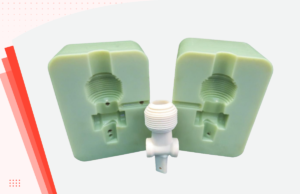 In the evolving world of manufacturing, small batch injection molding has become a preferred solution for businesses seeking flexibility, precision, and cost efficiency. Unlike traditional mass production, this process focuses on creating limited quantities of custom injection molded parts—ideal for prototyping, testing, or fulfilling specialised low-volume orders without compromising quality.
In the evolving world of manufacturing, small batch injection molding has become a preferred solution for businesses seeking flexibility, precision, and cost efficiency. Unlike traditional mass production, this process focuses on creating limited quantities of custom injection molded parts—ideal for prototyping, testing, or fulfilling specialised low-volume orders without compromising quality.
What Is Small Batch Injection Molding?
Small batch injection molding is a process where molten plastic is injected into a mold cavity to form parts in limited quantities, typically ranging from a few dozen to a few thousand units. It uses the same principles as large-scale molding but is optimised for efficiency and reduced setup time. This approach allows manufacturers to test designs, verify product performance, or produce niche products with minimal upfront investment.
It’s an excellent option for startups, R&D teams, or companies looking to validate their designs before full-scale production.
Benefits of Small Batch Injection Molding
- Cost-Effective for Low Volumes
- Traditional tooling can be expensive, but small batch molding uses aluminium or soft steel molds that are faster and cheaper to produce. This significantly reduces tooling costs, making it ideal for short runs.
- Faster Turnaround Times
- Since small batch projects use simplified molds and shorter setup processes, manufacturers can deliver parts quickly—perfect for rapid prototyping and product validation.
- Design Flexibility and Testing
- Small batch production allows for design changes and iterations between runs. You can refine product features, adjust materials, or improve functionality before committing to large-scale manufacturing.
- Reduced Waste and Sustainability
- By only producing the exact number of parts needed, companies reduce material waste, storage costs, and environmental impact—a key advantage in sustainable manufacturing.
Materials Used in Small Batch Injection Molding
A variety of thermoplastic materials can be used in small batch production, including:
- ABS (Acrylonitrile Butadiene Styrene): Tough and impact-resistant, ideal for automotive and consumer products.
- Polypropylene (PP): Lightweight and flexible, commonly used in packaging and everyday goods.
- Polycarbonate (PC): Known for clarity and strength, suitable for transparent parts.
- Nylon (PA): Durable and heat-resistant, used in mechanical and industrial components.
Material selection is critical to achieving desired mechanical strength, surface finish, and dimensional stability.
Applications of Small Batch Injection Molding
Small batch injection molding is widely used across multiple industries, including:
- Automotive: For testing prototype parts like clips, connectors, and trim pieces.
- Medical Devices: Producing small quantities of specialised components or prototypes for clinical trials.
- Electronics: Manufacturing custom housings and connectors.
- Consumer Goods: For startups developing new products in limited runs.
- Industrial Equipment: Creating replacement parts or low-volume specialty tools.
Optimising the Small Batch Injection Molding Process
Efficiency in small batch plastic manufacturing relies on several key strategies:
- Optimised mold design for quick cycles and minimal maintenance.
- Rapid mold change systems to switch between projects quickly.
- Precision process control for maintaining consistency in part dimensions and finish.
- Recyclable and cost-effective materials to improve sustainability.
Modern injection molding machines support automation and quick-turn production, allowing manufacturers to produce high-quality parts even at small volumes.
Why Choose Small Batch Injection Molding?
This process bridges the gap between rapid prototyping and mass production. It provides manufacturers with the flexibility to produce high-quality, precision-molded plastic parts at lower costs and faster lead times. Whether you need 100 or 5,000 parts, small batch injection molding ensures consistent quality, dimensional accuracy, and a professional finish—ideal for functional testing or limited product releases.
Conclusion
Small batch injection molding offers an efficient and cost-effective pathway for innovation. It enables companies to produce custom, durable, and high-precision plastic components without the heavy financial burden of large-scale production. By combining speed, flexibility, and precision, it empowers manufacturers to move quickly from concept to reality—keeping pace with today’s fast-changing markets.
In short, if your goal is to create high-quality injection molded parts in smaller quantities while maintaining control over cost and design, small batch injection molding is the smart choice.
To get more information, visit our website: https://customplasticproduct.com/











